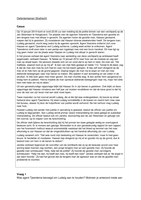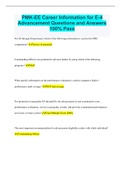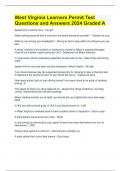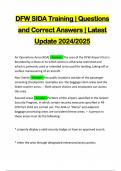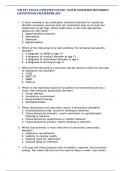made this list to help myself practice for the vocabulary exam for the class Language Skills in the 1ste semester of
the first year of my study. Because this was originally meant only for me it’s obviously missing quite a few words that
are present in the book, however I’ve found that studying this list really helped me get a high grade. So I hope it will
help you too!
The units and vocabulary listed off in the first row called ‘Words’ come from the English Vocabulary in Use, Upper-
Intermediate book (McCarthy & O’Dell, 2017).
The information that I put in the rows ‘Transcription’ and ‘Meaning / Example’ came from the Cambridge dictionary
website (Cambridge University Press, 1995).
I used the empty squares all the way on the right side of these tables to cross off the words I already knew, you
might find this useful too!
APA list:
Cambridge University Press. (1995). Cambridge Dictionary. Consulted on the 14th of October 2020, from
https://dictionary.cambridge.org/
McCarthy, M., & O’Dell, F. (2017). English Vocabulary in Use Upper-Intermediate (4th edition). Cambridge:
Cambridge University Press.
, Unit 1 Learning Vocabulary
Words Transcription Meaning / Example
1. Colloctation(s) Words that commonly go together (earn; money) (gain; time/advantage)
2. To coin to use (a phrase) for the first time
3. a felon /ˈfel.ən/ A person who is guilt of a serious crime
4.
5.
Unit 2 Organising a vocabulary notebook
Words Transcription Meaning / Example
1. Fi xed phra s es Words tha t commonl y go together (out of touch, In a hurry, to a nd fro)
2. Synonyms Words wi th the s a me mea ni ng
3. Antonyms oppos i te mea ni ng words
4. Stres s On whi ch pa rt of the word (whi ch s yl l a bl e) the s tres s fa l l s
5.
Unit 4 guessing and explaining meaning
Words Transcription Meaning / Example
1. Suffi x a l etter or group of l etters a dded a t the end of a word to ma ke a new
2. word. (-nes s , -l y, i l es s )
3.
4. Prefi x a l etter or group of l etters a dded to the begi nni ng of a word to ma ke a
5. new word. (-un, -i nm, -i l , -i r)
, Unit 5 Countries, nationalities and languages
Words Transcription Meaning / Example
1. The UAE The United Arab Emirates. one of the Middle East's most important economic centres
2. The commonwea l th 53 member states that are mostly former territories of the British Empire.
3. Fl emi s h /ˈfl em.ɪʃ/ the ma i n l a ngua ge of northern Bel gi um
4. Turki s h /ˈtɜː.kɪʃ/ bel ongi ng to or rel a ti ng to Turkey, i ts peopl e, or i ts l a ngua ge
5. La tvi a n /ˈl æt.vi .ən/ bel ongi ng to or rel a ti ng to La tvi a , i ts peopl e, or i ts l a ngua ge
6. Portugues e /ˌpɔː.tʃəˈɡi ːz/ bel ongi ng to or rel a ti ng to Portuga l , i ts peopl e, or i ts l a ngua ge
7. Ma l tes e /ˌmɒl ˈti ːz/ bel ongi ng to or rel a ti ng to Ma l ta , i ts peopl e, or i ts l a ngua ge
8. Ta i wa nes e /ˌta ɪ.wəˈni ːz/ bel ongi ng to or rel a ti ng to Ta i wa n or i ts peopl e
9. Is ra el i /ɪzˈreɪ.li / bel ongi ng to or rel a ti ng to Is ra el or i ts peopl e
10. Ira qi /ɪˈrɑː.ki / bel ongi ng to or rel a ti ng to Ira q or i ts peopl e
11. Kuwa i ti /kjuːˈweɪ.ti / bel ongi ng to or rel a ti ng to Kuwa i t or i ts peopl e
12. Pa ki s ta ni /ˌpɑː.kɪˈs tɑː.ni / bel ongi ng to or rel a ti ng to Pa ki s ta n or i ts peopl e
13. Yemeni /ˈjem.ə.ni / bel ongi ng to or rel a ti ng to Yemen or i ts peopl e
14. Ba ngl a des hi /ˌbæŋ.ɡl əˈdeʃ.i/ bel ongi ng to or rel a ti ng to Ba ngl a des h or i ts peopl e
15. Icel a ndi c /a ɪs ˈl æn.dɪk/ bel ongi ng to or rel a ti ng to Icel a nd, i ts peopl e, or i ts l a ngua ge
16. Sl a voni c /s l əˈvɒn.ɪk/ of/or Rus s i a , Pol a nd, Bul ga ri a , a nd of centra l a nd ea s tern Europe
17. Swi s s /s wɪs / bel ongi ng to or rel a ti ng to Swi tzerl a nd or i ts peopl e
18. Tha i /ta ɪ/ bel ongi ng to or rel a ti ng to Tha i l a nd, i ts peopl e, or i ts l a ngua ge
19. Greek /ɡri ːk/ bel ongi ng to or rel a ti ng to Greece, i ts peopl e, or i ts l a ngua ge
20. Dutch /dʌtʃ/ bel ongi ng to or rel a ti ng to the Netherl a nds , i ts peopl e, or i ts l a ngua ge
21. Cypri ot /ˈs ɪp.ri .ət/ bel ongi ng to or rel a ti ng to Cyprus or i ts peopl e
22. a Fi nn /fɪn/ a pers on from Fi nl a nd
23. a Swede /s wi ːd/ a pers on from Sweden
24. a Turk /tɜːk/ a pers on from Turkey
25. a Spa ni a rd /ˈs pæn.jəd/ a pers on from Spa i n
26. a Da ne /deɪn/ a pers on from Denma rk
27. a Bri ton /ˈbrɪt.ən/ a pers on from Bri ta i n
28. a n Ara b /ˈær.əb/ a person from Western Asia or North Africa who speaks Arabic as a first language
29. a Pol e /pəʊl / a pers on from Pol a nd
30. a Bel gi a n /ˈbel .dʒən/ bel ongi ng to or rel a ti ng to Bel gi um or i ts peopl e
31. a Ca ta l a n /ˈkæt.ə.l æn/ a pers on from the Ca ta l oni a regi on of Spa i n
32. a Greek /ɡri ːk/ a pers on from Greek
33. a n Afri ca n /ˈæf.rɪ.kən/ bel ongi ng to or rel a ti ng to Afri ca or i ts peopl e
34. a Dutch ma n
35. a French ma n
36. a n Iri s h ma n
37. a n Icel a ndi c ma n
38. Ethni c groups /ˈeθ.nɪk ɡruːps / rel a ti ng to a pa rti cul a r ra ce of peopl e
39. Di a l ect /ˈda ɪ.ə.lekt/ a form of a l a ngua ge tha t peopl e s pea k i n a pa rti cul a r pa rt of a country
40. Bi l i ngua l /ba ɪˈl ɪŋ.ɡwəl / a bl e to us e two l a ngua ges equa l l y wel l
41. Mul ti l i ngua l /ˌmʌl .ti ˈl ɪŋ.ɡwəl / a bl e to us e more tha n two l a ngua ges
42. Monol i ngua l /ˌmɒn.əʊˈl ɪŋ.ɡwəl / s pea ki ng or us i ng onl y one l a ngua ge


